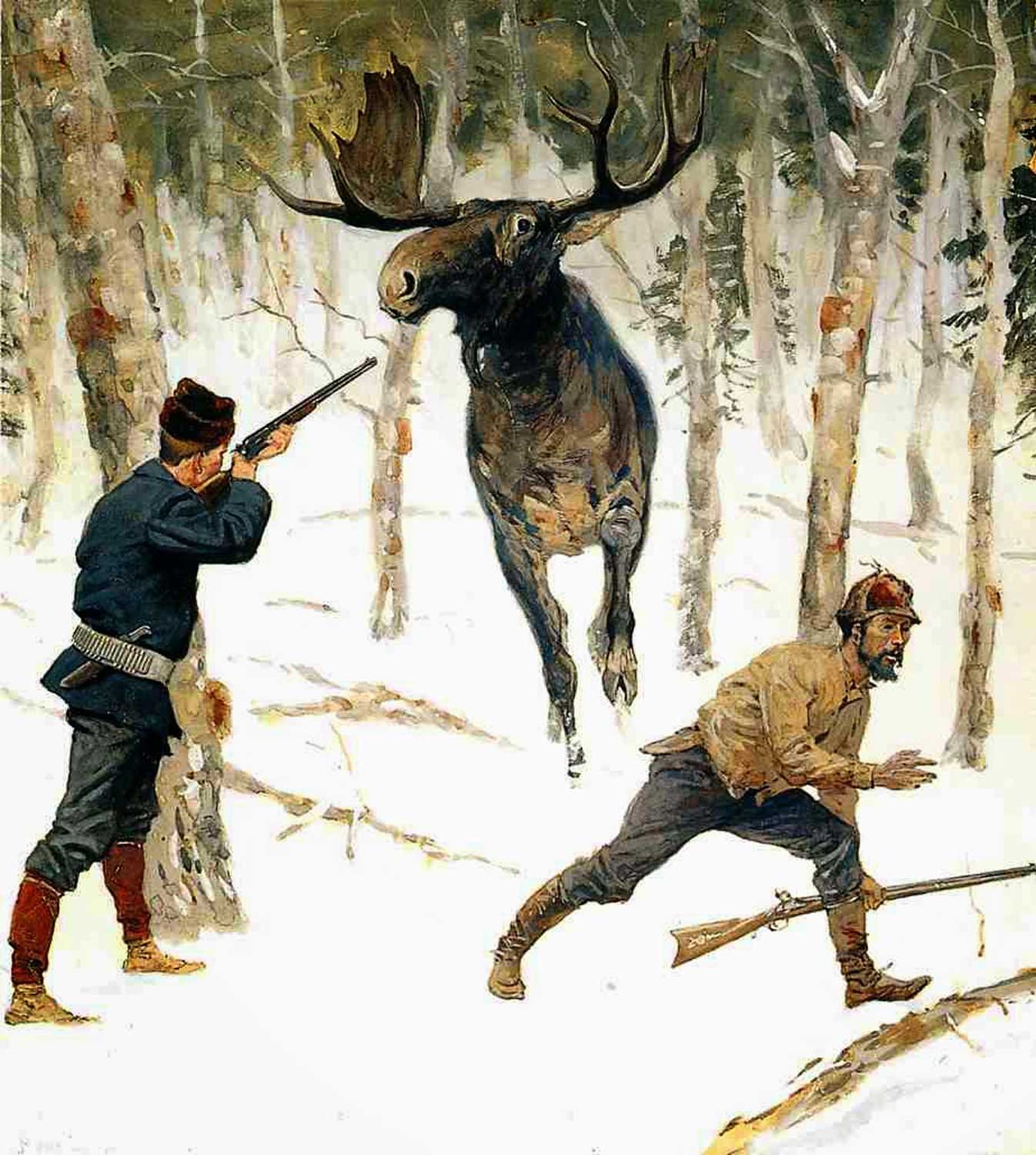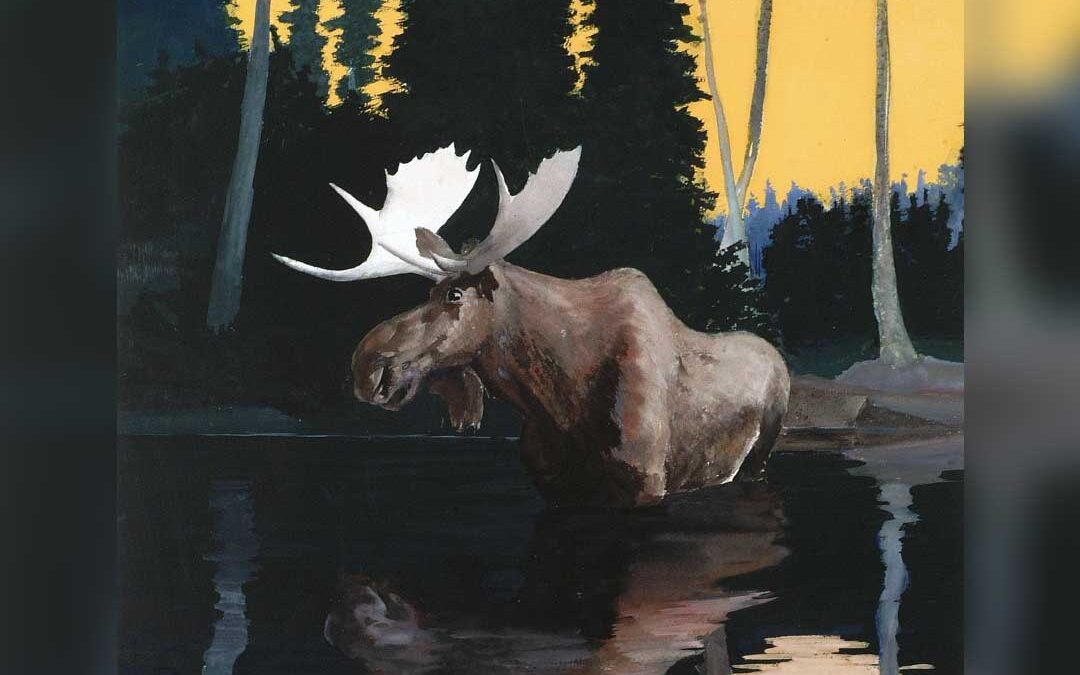“Yep” sighed old Ez, as he bunched a forkful of chewing and elevated it into the gap in his features, “I’ve seen ’em. An’ I can say that jedgin’ by what I see of ’em they’re tough customers. I hain’t a-hankerin’ to renew my acquaintance with ’em—they’re a trifle too devilish fer your uncle Ezra, says I.”
The speaker relapsed into the depths of his chair and chewed reminiscently at his cud. We, who sat on either hand, hitched our chairs surreptitiously nearer and glanced at each other knowingly. Dave Cotton was getting his tongue loosened to propel an inquiry when signs of recurring animation on Ezra’s part made him pause.
“You git one of them big fellers with fire in his eyes and froth on his teeth about ten jumps behind an’ a man ’ll go some, I tell ye. Me ’n Bill Fikes was huntin’ up on the Winnebigash….”
“Hol’ on, Ez,” broke in George Tolliver. “What sort of a nightmare be you talkin’ about, anyhow?”
The narrator eyed his interrupter briefly.
“Didn’t I tell you at the start?” he asked. “Not to be noticeable, you didn’t,” said George, shaking his head emphatically.
“Well, I was referrin’ to moose, boys—kind of a cross betwixt a Bengal tiger an’ a camel with the jumpin’ toothache—always mad enough to eat a kag o’ spikes. As I was sayin’, Bill an’ me was perambulatin’ through them woods when all of a sudden Bill puts his hand agin my vest an’ shoves me back about five foot.
“‘S-s-s!’ he says, kinder low an’ spooky.
“‘What in th’ dickens do ye see?’ says I.
“‘Covey o’ moose,’ says Bill, tremblin’ so his keys rattled.
“Jest then one o’ th’ critters give a cough that sounded like tearin’ a clapboard off’n a house an’ I located ’em. There was three of ’em—a bull, a cow an’ a calf. When th’ cow got a whiff o’ Bill’s tobacker, she peeled back her upper lip an’ showed about 67 of th’ meanest lookin’ teeth I ever laid eye on. I says to Bill:
“‘Let’s pull our freight.’
“Bill snorted like a little gasoline boat in disgust.
“‘Pull nuthin,’ he says, ‘why, them animiles can go 70 mile an hour with their legs broke. Can you beat that?’
“I said no, I couldn’t, but that bein’ et by a moose in a lonesome neighborhood didn’t appear as pleasin’ as it might.
“‘Pshaw!’ says Bill, ‘I’ll show ye a trick I got from th’ Injuns back in th’ ’70s. I’ll scare them moose into nervous posterity or I hain’t Bill Fikes.’
“Bill peeled his coat an’ passed it to me. Then he tied a red bandanner round his head an’ took his fur cap in his front teeth.
“‘Now see ’em hit th’ high spots,’ says he.
“‘Good-bye, Bill, ye died brave,’ says I, squeezin’ his hand warmly.
“Bill stuck his thumbs into his ears, leaned over an’ started fer them critters yellin’ like a Piute grave robber bit by a rattlesnake. He was a terrifyin’ object an’ fer ’bout a secont he had them moose a-guessin’, I tell ye. But jest then th’ bull pawed up a wagonload of dirt an’ let out a beller that purty nigh loosened th’ fillin’ in my hind teeth.
“‘Beware, Bill’ says I, ‘he’s pointed your way.’
“Bill emitted another choice combination of whoops, an’ jest then that infarnel beast made a 40-foot leap an’ grabbed my pore pardner with his fangs. Bill give a yelp an’ I swarmed up a tree like a Dago pursued by th’ invitation committee o’ th’ Black Hand.”
The narrator paused and thoughtfully switched his cud to his left cheek. In the suspense that ensued he glanced tentatively at the barkeeper, who was perusing the evening paper and did not look up. After hemming a few times, Lem Burton clutched his chin in his hands and asked:
“Do moose bite? That’d make ’em carnivorous, wouldn’t it, Ez?”
“Make ’em what?” ejaculated Ezra, bristling up. “Carnivorous or no carnivorous, I tell ye that moose stood there a-holdin’ my devoted pardner in his teeth an’ lookin’ as mad as a pug dog that has dug up a hornets’ nest. An’ Bill was originatin’ a line o’ talk that blame nigh set th’ bushes afire, too.
“Jest then th’ critter got his eye on me, an’ he come a-rippin’ over my way, luggin’ Bill along like a cat would a mouse. Bill seen me about 50 feet up th’ tree an’, after callin’ me some o’ th’ nicest names he could think of, he says:
“‘Come down here an’ grab ’im.’
“‘Grab ’im yourself—I don’t want ’im’ says I.
“That made Bill mad, an’ he hit the moose on th’ nose with his fist. Of course that insulted th’ critter an’ he begun tryin’ to connect Bill’s skull with th’ tree.
“Bill managed to miss most of th’ time, but once in a while h’d foul it an’ th’ way he’d refer to me in those instances was a caution. I had a notion to go down an’ kick him once, but got another not to.
“All to once Bill’s suspenders give way an’ he come sailin’ up onto my limb.
“‘Was it hot at th’ seashore this year?’ says I, kinder grinnin’ at him.
“Bill snorted an’ tried to hit me in th’ eye but missed an’ almost fell off’n th’ limb.”

The Moose Hunt by Frederic Remington
Ezra dropped his chin on his shirt bosom and studied the floor. After a furtive glance toward the bar he sighed, and resumed:
“Me ’n Bill sot there on that limb fer jest four days, eatin’ nothin’ but woodpecker stew an’ tobacker. When we got down to ground agin, Bill was so bowlegged that he never outgrowed it—hangin’ to that limb was what done it.”
The speaker yawned and combed his whiskers with his fingers. After a moment’s delay, Lem Burton fidgeted uneasily and remarked:
“Where was th’ moose?”
Ezra squinted at the questioner with every indication of surprise and annoyance.
“Moose?” said he, “why, he went to sleep an’ walked off. Moose always walk in their sleep, ye know, so all we had to do was wait fer him to git to sleep. An’ besides that, he was thunderin’ thirsty—hadn’t had a drink o’ nothin’ fer four hull days—any o’ you fellers knows what it is to be thirsty an’ not have nothin’ to drink? Of course, me ’n Bill was—eh? Thirsty? Why, yes, just a trifle that way. Take th’ same, Jim—thanky!”
This article originally appeared in the May 1907 issue of Outing.

